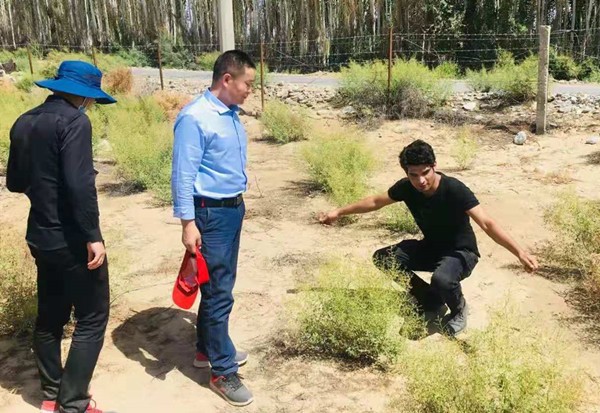Experiencing life and science research in Xinjiang

It gives me immense pleasure to share my experience in China, one of the world's most dynamic and vibrant countries. As a researcher, I have observed that science is getting a boost in China, and government research funding in China has been growing tremendously, resulting in outstanding progress in scientific research. China is home to top universities and government research institutes offering unrivaled opportunities in different scientific disciplines to their citizens and foreigners around the globe.
One of Xinjiang's most challenging environmental issues is desertification, responsible for direct economic losses and regional development. With the guidance of Professor Zeng Fanjiang, we have conducted a series of experiments to study physio-biochemical mechanisms of desert plant species to explore possible alternative strategies for improving vegetation restoration in arid regions.
We examined the impact of nutrients application and water regimes in improving the drought tolerance of desert plant species, growth, the stoichiometry of foliar nutrients, and seedlings' survival rate. What could be more exciting than working with village locals in the field, searching for experiment sites, preparing experiment plots, sowing seeds, and regularly watering the experiment plots? It was indeed a fantastic experience interacting with locals because there are many similarities in the culture and even certain social traditions between Pakistan and Xinjiang. Their sheer hospitality made me feel a robust and deep connection with this region, and I think it's vital to step up cultural exchanges to understand each other better.
It is essential to share that Cele National Research Station is an ideal platform for experimentation; I was utterly amazed by the standard, facilities, and convenience of researching at this research station. Although the timing was not perfect due to the surge of the COVID-19 pandemic, I must appreciate the efforts of the Xinjiang government in combating this deadly disease. I felt the warmth and care of the staff at the Xinjiang Institute of Ecology and Geography (XIEG), Chinese Academy of Sciences (CAS), towards foreigners during this pandemic because I can never forget that isolation time which I had spent indoors and the cooperation of the XIEG management to ensure my day-to-day existence and good health.
Although I had a prior experience of life in China during my PhD studies at the Chengdu Institute of Biology of CAS, I found Xinjiang a unique, memorable, and fast-changing region of China, opposite to most people's notions, including mine. In addition to beautiful landscapes, delicious foods and daily-life facilities, the people of Xinjiang are very warm-hearted, friendly, and cooperative.
Xinjiang is rich in culture and ethnic diversity. I have observed that people in Xinjiang from different walks of life have been working hard and significantly contributing to the development of society.
In addition to providing me with an ideal research platform, experiencing new cultures and life, the CAS President’s International Fellowship Initiative (PIFI) also allowed me to extend my research collaborations. It helped me keep my research interest fresh and broadened my scientific research vision. Working with international scientists outside of my academic comfort zone enriched me with novel skills that improved my research and made me a productive and innovative researcher.
Thanks to my Chinese/international friends and colleagues for making my life remarkably meaningful and enjoyable here. It would be an honor for me if I could serve in the further development of the XIEG and the regional development of Xinjiang in the future. I would have shared a much better experience than this if the world was COVID-free.
- Appendix
-



